

Søren Kierkegaard. D hume. Socrate atene. Socratis. Aedesia. David Hume (1711–1776): Themes, Arguments, and Ideas. The Uncertainty of Causation Hume observes that while we may perceive two events that seem to occur in conjunction, there is no way for us to know the nature of their connection.
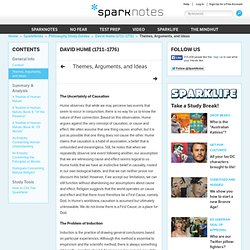
Based on this observation, Hume argues against the very concept of causation, or cause and effect. Nietzsche on Love. Your complimentary articles You’ve read one of your four complimentary articles for this month.
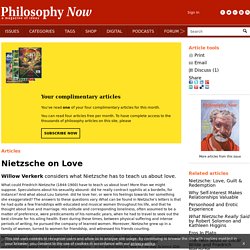
You can read four articles free per month. To have complete access to the thousands of philosophy articles on this site, please Articles. Philosophize This! Wittgenstein's Ladder: Introduction. Ludwig Wittgenstein, Culture and Value (1) In the autumn of 1939, Ludwig Wittgenstein and his young Cambridge student and friend Norman Malcolm were walking along the river when they saw a newspaper vendor's sign announcing that the Germans had accused the British government of instigating a recent attempt to assassinate Hitler.
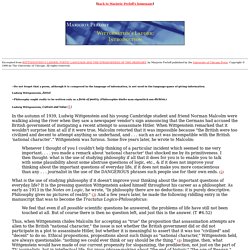
When Wittgenstein remarked that it wouldn't surprise him at all if it were true, Malcolm retorted that it was impossible because "the British were too civilized and decent to attempt anything so underhand, and . . . such an act was incompatible with the British 'national character'. " Wittgenstein was furious. Wittgenstein’s forgotten lesson. Ludwig Wittgenstein is regarded by many, including myself, as the greatest philosopher of this century.
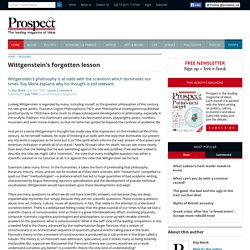
His two great works, Tractatus Logico-Philosophicus (1921) and Philosophical Investigations (published posthumously in 1953) have done much to shape subsequent developments in philosophy, especially in the analytic tradition. His charismatic personality has fascinated artists, playwrights, poets, novelists, musicians and even movie-makers, so that his fame has spread far beyond the confines of academic life. And yet in a sense Wittgenstein’s thought has made very little impression on the intellectual life of this century. As he himself realised, his style of thinking is at odds with the style that dominates our present era. Wordsworth, Wittgenstein, and the Reconstruction of the Everyday. Nonsite.org - Article - Issue #3 Wordsworth, Wittgenstein, and the Reconstruction of the Everyday The idea that poetry just might be more philosophical than philosophy itself marks thinking about poetry and poetics in the Romantic tradition almost singularly.

Poetry for the early German Romantics, for instance, speaks to and actually dissolves philosophical problems better than philosophy can; it outdoes philosophy in a certain ability of “thinking.” For the Jena Romantics, it is a matter of the reversal of the genres in the ancient quarrel: poetry, in the broad sense, can for someone like Friedrich Schlegel actually do or enact something in the world of ideas that philosophy simply cannot, and philosophy thus ultimately takes second place to the Romantic poeticizing of the world. “Where philosophy stops, poetry has to begin,” he announces.1 Early German Romantic literature not only comes into hitherto unimaginably close contact and tangled concourse with philosophical thought. Zizek - En su insolente mirada. Φ-Phi vrs ORCH-OR: As Above, So Below. Towards a Science of Consciousness Conference, Tuscon, April 2014. Space Time Foam φ-Phi by Giulio Tononi: Evoking the paradigm as a key Synergy behind Human Consciousness, explicitly on Page 164.
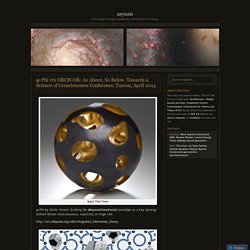
Integrated, Irreducuble, Infinite Seeking a “middle path” between the Orch OR & Phi-IIT positions by exploring their common optimal, analogical geometries Some Asynsis-Constructal speculations on the relationships between the Orch OR theory of Penrose-Hameroff-Bandyopadhyay and Phi-IIT theory of Tononi-Koch-Tegmark in terms of Chalmer’s Hard problem of the subjective self and optimal, analogical geometries. EDUCATION.